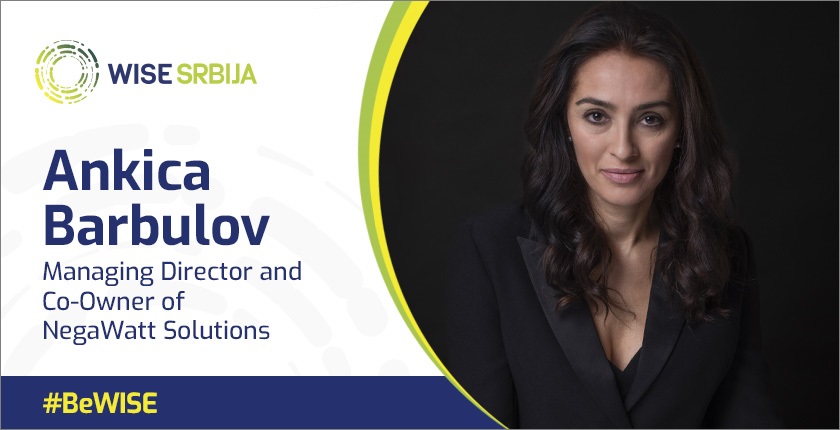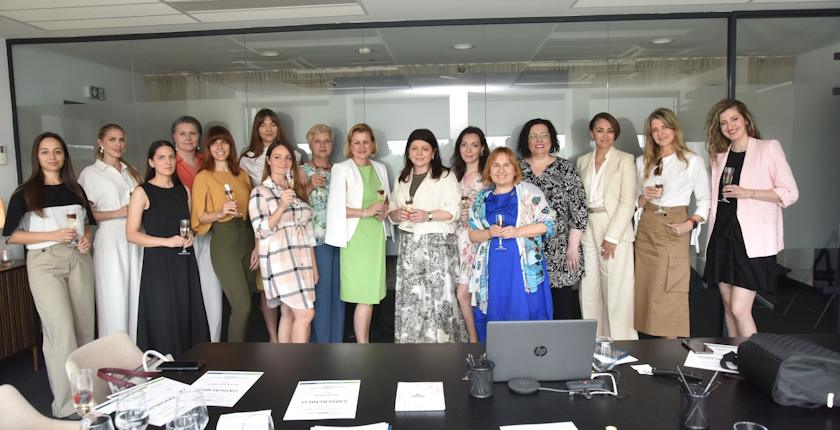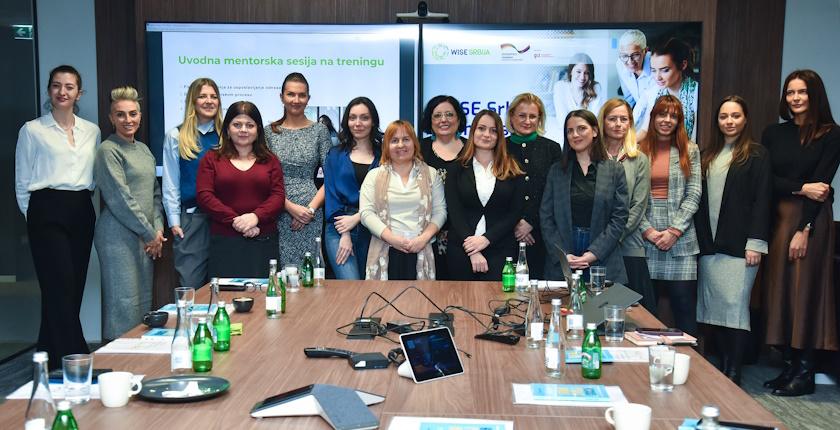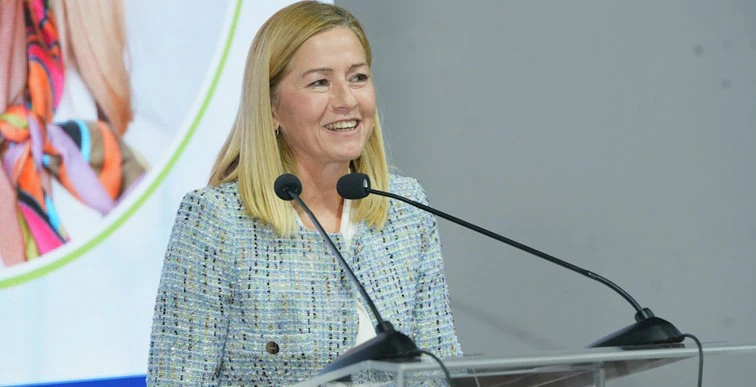Ankica Barbulov, a member of the Advisory Board of the WISE Serbia women’s network, has been in the energy business for more than a decade. Since 2020, she has been running her own company, Negawatt Solutions, which develops ESCO projects. Through her work, but also thanks to her tireless enthusiasm, she helps implement a large number of energy efficiency and green technology projects in Serbia, at the local level and through public-private partnerships.
In the first of a series of interviews with members of the Advisory Board of the WISE Serbia network of women, Balkan Green Energy News spoke to Ankica Barbulov about her career path in the energy sector, the role of Negawatt Solutions in the development of ESCO projects, the challenges she faces, but also about her work on empowering women through the WISE Serbia network. Her answers provide insight into the complexity of the energy sector and inspire optimism about a future based on efficiency and sustainability.
“I didn’t choose energy, it chose me,” Barbulov said when asked what inspired her to embark on a career in energy. After completing her Chinese language studies and practicing it for ten years, she was offered a job in the energy sector in early 2012, while doing her master’s degree in business administration in Slovenia.
Selling ESCO services was not possible in Serbia until 2013
“At that time, home appliances producer Gorenje and two large Slovenian energy companies, Energetika Ljubljana and Geoplin Slovenia, recognized the pressing need to expand their portfolio to what was already seen as an inevitable trend – the improvement of energy efficiency. This is how one of the first ESCO companies in the region was created – when energy suppliers decided to invest in energy efficiency measures precisely with the aim of keeping their existing clients, which is a classic ESCO concept,” says Barbulov.
Since Slovenia is a relatively small market, the focus quickly shifted to Serbia, almost from the first year of operation. “I was among a group of people who seemed ambitious enough and convinced that the same concept must be developed in Serbia and that the Serbian market would accept it.”
The sale of ESCO services was not possible in Serbia until 2013, when the energy efficiency law was passed. It introduced the concept of an ESCO company, as a provider of energy services, into the country’s regulatory framework for the first time. Even though this model seemed ideal, Barbulov managed to sign the first contracts on behalf of the company she represented at the time only in late 2016, in the field of public lighting, and in mid-2017, in the thermal energy segment. With those contracts, Serbia’s ESCO market officially came into existence.
The ESCO model is still underutilized in Serbia
The potential for ESCO projects in Serbia is huge, in both the public and private sectors. However, it seems that this concept is still not sufficiently recognized, nor used. In very simple terms, Barbulov explains what ESCO services are:
“An ESCO firm, which is usually a company that already provides some energy services, such as engineering, approaches a client with an offer to improve the energy efficiency of an existing building or plant by devising an optimal technical solution tailored to the client’s needs, but also by financing the project from its own resources. If a cooperation agreement is successfully concluded, the client and the ESCO company enter into a long-term contractual relationship, during which the ESCO company implements the agreed measures, maintains the installed equipment and, most importantly, guarantees energy and financial savings to the client for the entire duration of the contract. Guaranteed savings are crucial in this relationship, because the client pays the ESCO company for the services provided from these savings. Contracts are normally signed for a period of 5 to 20 years, depending on a number of factors – the size of the investment, the payback period, the equipment’s lifespan,” explains Barbulov.
“From the moment the chosen technical measure is implemented and the equipment is put into operation, the client achieves monthly savings in both energy and money.” From the achieved savings, the client allocates funds to pay a fee to the ESCO company for the entire energy service – the initial investment and the costs of maintenance and management of the implemented technology,” she explains.
Public buildings could be energy renovated completely through ESCO projects – the key is in combining public and private capital
Given that ESCO involves a long-term collaboration between two partners, in the public sector this model is realized as a public-private partnership. Many facilities in Serbia’s public sector are energy-intensive. Hospitals, retirement homes, and correctional facilities all work 365 days a year, and the majority of these and other facilities, such as schools, walk-in clinics, municipal buildings, libraries, courts, and universities, are also very energy inefficient.
These two factors, combined with rising energy prices (natural gas, liquid fuels, electricity), make energy efficiency projects sustainable in every respect, while those implemented through the ESCO model also pay off relatively quickly.
This means that these projects can very often be fully implemented exclusively with the private capital of ESCO companies, so that the public sector does not need to invest anything (no public debt is created) – it can simply use this model and enjoy the benefits such as energy savings, an improved environment, as well as financial savings.
The state has yet to grasp the potential of PPP in buildings’ energy efficiency
“For part of the building stock, where the scope of required investments is greater and the payback period somewhat longer, the model of joint investment by a public partner and an ESCO company can be applied. This has been very successfully applied, for example, in Ljubljana. In this way, by involving private capital, every cent of taxpayer money invested would have a much greater financial effect compared to the traditional way of financing such projects – solely from the state budget. Additionally, by partnering with ESCO companies, the state benefits from their expertise, as well as their human resources, which increases the quality and quantity of works performed on the reconstruction of the public building stock. Unfortunately, the state has not yet understood the potential of PPP in this segment and does not deal with this issue systemically,” emphasizes Barbulov.
Understanding market trends years in advance is crucial
Women make up one third of the total number of entrepreneurs in Serbia, according to data from the Business Registers Agency. Also, only one in four women in Serbia is a founder, member, legal representative or CEO of a company, and Ankica Barbulov is one of them. She founded her own company, Negawatt Solutions, in 2020.
In addition to the challenge of finding an appropriate technical solution, Barbulov pointed out that in her job it is even more important to understand the client’s needs and know which of the range of benefits offered by her company’s services should be presented to the client first.
“To survive in business, it is crucial to understand trends several years in advance and prepare for them. Nobody likes change, but we have to find the best way to embrace and integrate it. When it comes to ESCO business, this means applying renewable energy sources in existing energy systems and buildings in a way that would be sustainable both financially and in terms of functionality. This is definitely a challenge, because these technologies are expensive and there are technical limitations in their application. Budgets are limited, additional allocations for energy are not welcome anywhere, while the energy transition, decarbonization policy, as well as the environment itself, make this both necessary and inevitable,” says Barbulov.
The solution, in Barbulov’s view, is in partnerships between private companies and between the private and public sectors, as well as in the integration of the electricity and thermal energy sectors.
Women in Serbia are not equal in many ways, and are less valued in the energy sector
The WISE Serbia network of women plans to launch a mentoring program for young women, and Ankica Barbulov sees her role in it as a mentor.
“First of all, I think that young women engineers should be empowered. In a man’s world, they rarely get the opportunity to prove themselves and advance their careers. Through the WISE network, where they would spend time around women who have built successful careers in the energy sector, they would learn to fight, to become leaders. I believe that by including more women in leadership positions, we, as a country, would become greener much faster,” said Barbulov.
Women believe much more than men that the energy transition is necessary and inevitable
“In my company, we have a male colleague who, when we’re hiring new engineers, insists that the engineer be male. Why? Because when you’re in the field, visiting various technical facilities or performing works, most of the people you meet are men. When a woman shows up and starts talking, they often don’t even listen. They pay less attention and value her less – because how can a woman understand a man’s work,” says Barbulov.
Women believe much more than men in new technologies and renewable energy sources, they accept changes more easily and care more for the environment, according to Barbulov. She believes that women in business are guided by different and more important values than men, who are, in her words, mainly interested in “charging as much as possible and finishing the job as quickly as possible.”






